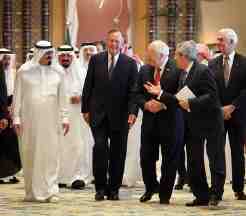'Iraq: The Logic Of Withdrawal'
/By: Ali Moosavi / The Arab American News [HERE]
The word "Iraq" once evoked images of Nazi-style dictatorship and ruthless suppression of dissent, as well as ethnic cleansing. Since 2003, however, "Iraq" has become synonymous with mass casualty terrorism, catastrophic sectarian bloodletting, American casualties and a failing occupation with no end in sight that's become a nightmare for policymakers.
The debate — both in the media and in Washington — is either "stay the course because the terrorists will win," or it's "how do we gradually withdraw, so we can better fight the terrorists?" Both views reflect a consensus of what's good for the American empire, and the latter — voiced by the Democrats and other liberals — not only supported the war from the beginning, their "anti-war" stance is nothing more than opportunistic political gain.
The real anti-war movement that sought to head off the 2003 invasion by exposing the Bush administration's false pretexts and organizing mass protests has yet to crystallize around an anti-occupation movement that effectively challenges the underlying pillars of the occupation.
In a timely and well-written tome, "Iraq: The Logic Of Withdrawal," writer and activist Anthony Arnove — editor of "Iraq Under Siege," a collection of essays about the devastating sanctions against Iraq — addresses this gap and effectively demolishes the propaganda behind the occupation. And, as the title suggests, he goes a step further, and proposes the only sane way to escape this insane state of affairs — immediate and unconditional withdrawal.
Short and to the point, Arnove cuts through the fog of war propaganda and goes to the heart of the occupation — imperialism. The United States is an empire, Arnove correctly notes, and that far from the lofty pretensions of liberating the oppressed and spreading democracy, "Operation Iraqi Freedom" was done for self-serving reasons, namely spreading and maintaining hegemony in the Middle East.
Polemical and passionate, he argues that withdrawal not only is feasible, it's the only way to guarantee justice and democracy for Iraq. And not just a withdrawal, but also an immediate withdrawal, not the timetable scenario proposed by alleged anti-war Democrats and Republicans.
As such, he undermines the usual arguments against such a proposal, namely the sectarian bloodbath that will inevitably spiral out of control once U.S. troops leave. As Arnove points out, however, it's the occupation that caused this war within the war to erupt, and not least due to the divide-and-conquer tactics, such as arming Shi'a militias for "counter-insurgency" work for the U.S. and British.
Such predictions proved to be wrong in the case of Vietnam in 1975 and the Israeli retreat from Lebanon in 2000, and they will be wrong in the case of Iraq.
While Arnove's arguments are correct, the tone and format of the book falls back on the usual lefty language that tends to alienate ordinary people.
Yes, we are living in an empire and the occupation of Iraq is an act of imperialism, but most people don't understand or relate to such words. If the aim is to educate and mobilize the masses, then use the language of the masses.
Arnove is correct that the movement shouldn't be apolitical when dealing with people about Iraq, but that doesn't mean we have to create distance fromh them by using elitist-sounding language, either. Maybe we can bridge that gap when the cultural gap is bridged and the concepts of anti-imperialism filter down to the masses via the culture route, but until then, we have to find an effective way to communicate.
That's not to say the book's length isn't suitable, given the attention span of most Americans; at 85 pages, it shouldn't be too much for the average person. Unfortunately, with succinctness comes a shortage of facts — whether deliberately, or through absence of mind, Arnove leaves out key facts that could strengthen his book.
For example, Arnove cites the main reason for the invasion of Iraq as the country's vast oil supplies. While that reason was very important, so was the securing of Israel and America's Persian Gulf monarchies, which felt threatened by Ba'athist nationalism. "A Clean Break," authored by such neocon luminaries as Richard Perle and Douglas Feith, called for the removal of Saddam Hussein, "an important Israeli strategic objective in its own right."
More to the point, it was Ba'athist nationalism that saw the nationalization of Iraqi oil in 1972, causing the Nixon administration to funnel arms to Kurdish insurgents via Iran, an episode that ended in 1975 with the Algiers Accords. According to the Pike report, issued by the U.S. House Select Committee on Intelligence, the campaign was meant to destabilize Baghdad, not promote Kurdish rights.
"Documents in the Committee's possession clearly show that the President [Richard Nixon], Dr. Kissinger and the foreign head of state [the Shah of Iran] hoped that our clients [the Kurds] would not prevail," the report concluded. The infamous Henry Kissinger crafted the policy and secretly funneled millions of dollars to the operation, yet this gets no mention in Arnove's book.
There are other facts left out as well. As one of the neoconservative architects of the invasion, Paul Wolfowitz gets his fair share of condemnation by Arnove. However, he leaves out a Defense Planning Guidance report Wolfowitz authored at the Pentagon, along with I. Lewis Libby.
"The document argued that the core assumption guiding U.S. foreign policy in the 21st century should be the need to establish permanent U.S. dominance over virtually all of Eurasia," reported Jim Lobe for Alternet.org.
Despite these and other relatively minor shortcomings, "The Logic Of Withdrawal" is an important book at a time when everyone is against the occupation, but no one is doing anything about it. Hopefully, the book will serve as a catalyst for a movement to emerge that will challenge the occupation in radical anti-colonial and anti-racist terms, one that will break out of its ghetto and into the rest of society. [MORE]












































































































































































































































































